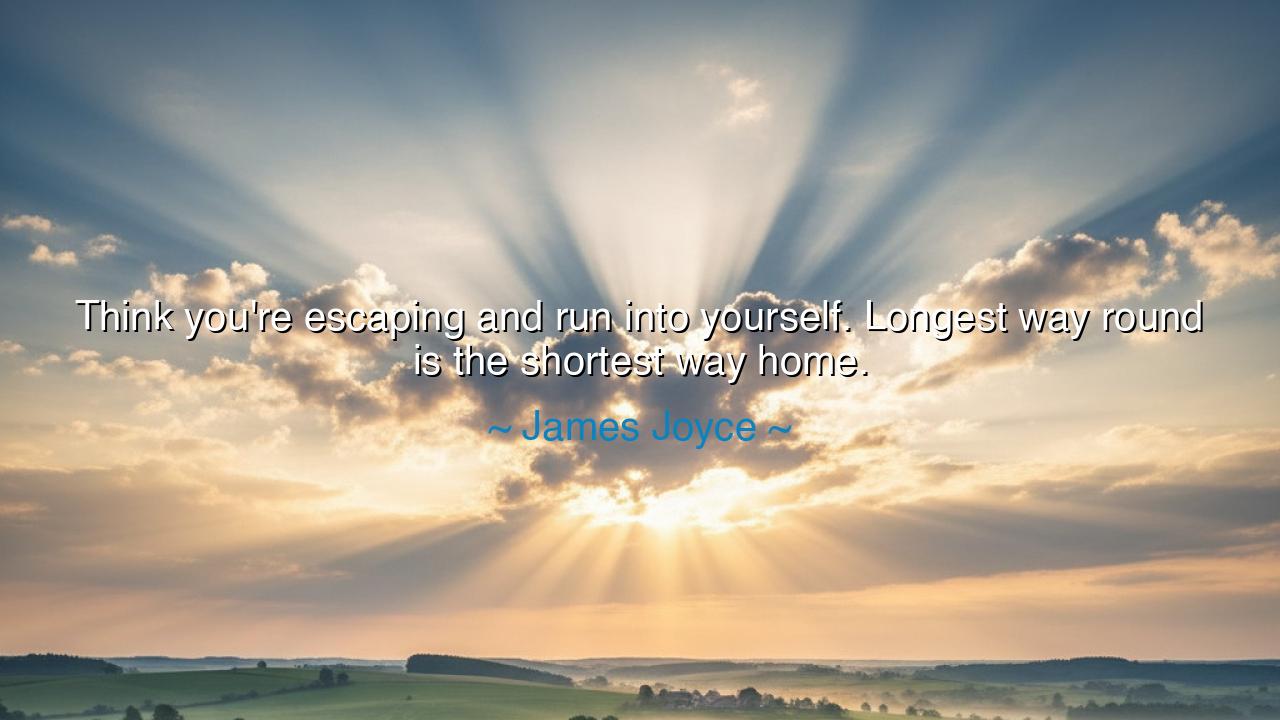
Think you're escaping and run into yourself. Longest way round is
Think you're escaping and run into yourself. Longest way round is the shortest way home.






“Think you’re escaping and run into yourself. Longest way round is the shortest way home.” — James Joyce
Thus spoke James Joyce, the wanderer of words and the sculptor of the human spirit, in his great work Ulysses. In these few lines lies a truth as vast as the sea Odysseus once sailed — that no matter how far one flees, the path of escape often leads back to the very heart one tried to avoid. For to run from oneself is to circle endlessly, and only through the long journey — the journey through doubt, failure, and discovery — does one finally return home, not to a place, but to a state of being.
Joyce, like the heroes of myth, wrote of exile and return. In Ulysses, he mirrored Homer’s ancient tale through the lives of ordinary people in Dublin, showing that every man’s wanderings are spiritual voyages. When he writes, “Think you’re escaping and run into yourself,” he speaks not only of the character’s struggle, but of all humankind. We seek to flee pain, guilt, or truth, only to find that these shadows follow us. The farther we travel, the more intimately we meet the self we had hoped to leave behind.
The ancients knew this well. Odysseus, after years upon stormy seas, found that every monster he faced — the sirens, the cyclops, the wrath of Poseidon — was but a reflection of his own pride and yearning. His voyage was not just across waters but within his own soul. When at last he came home, it was not Ithaca alone he reclaimed, but his truest self. Joyce, in his modern wisdom, reminds us that the longest way round — the hard, winding path of experience — is the only road that leads us home.
There are those in every age who seek a shorter way — who would flee from discomfort or confusion, believing that peace lies elsewhere. Yet peace is not found in escape; it is found in endurance. Buddha himself, before enlightenment, fled from pleasure, from suffering, from the world. But in the end, he sat beneath the Bodhi tree and turned inward. There, in the silence of the self, he realized that the journey outward was but a reflection of the journey within. The man who confronts himself walks the longest road, yet he alone reaches the destination.
Joyce’s words also speak to the artist, the seeker, and the soul in crisis. Many flee from their calling because it leads them into darkness. But as the old mystics taught, you must descend to rise. The longest way round — through failure, heartbreak, doubt — refines the spirit. The man who chooses the shorter path, avoiding struggle, may reach quickly, but he arrives hollow. The man who takes the long way — the road through hardship and honest self-encounter — returns wiser, humbler, and whole.
This is the great paradox of growth: that to come home, one must first wander far. The path of the heart is not straight but circular. Every escape — from one’s home, one’s people, one’s self — is merely another step in the pilgrimage of return. To run into yourself, as Joyce says, is the moment of awakening, when you realize that home was never lost, only forgotten. The purpose of the journey was not to find something new, but to remember what was always there.
So let this teaching be heard by all who travel through the wilderness of life: do not fear the long road, nor the lonely one. For every detour, every trial, every seeming failure brings you closer to yourself. The journey you think leads away from truth is often the very one that carries you to its gates. In the end, as Joyce tells us, the shortest way home is the longest way round — because the road of self-discovery has no shortcuts, and only through patience, humility, and courage may the traveler truly return.






AAdministratorAdministrator
Welcome, honored guests. Please leave a comment, we will respond soon